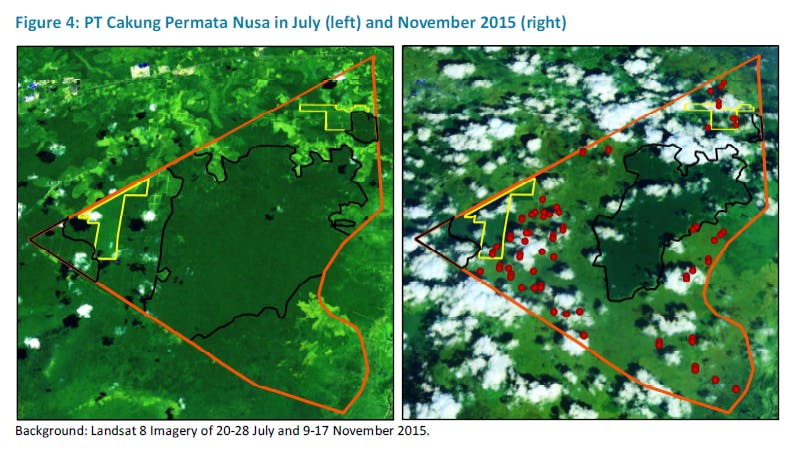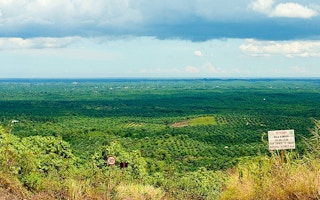Since pledging a year ago to purge its supply chain of deforestation, Astra Agro Lestari, one of Indonesia’s largest palm oil companies, has had mixed results, according to a new report by the consultancy Aidenvironment.
Astra is the second-largest oil palm grower in Indonesia, the world’s top palm oil producing country. The firm also operates a pair of refineries in the archipelagic nation. These facilities source Astra’s own plantations as well as third-party suppliers.
No instances of forest clearing were found to have taken place in Astra’s own concessions since September 2015, when the company issued the zero-deforestation pledge.
“
Palm oil plantations on peat are extremely fire-prone, and we want to see Astra making a serious effort to restore degraded peatlands and forests within its concessions.
Anja Lillegraven, Rainforest Foundation Norway
That doesn’t mean forests under Astra’s care weren’t destroyed. In the months after Astra made its pledge, a large number of fires burned across its holdings, contributing to the 2015 Southeast Asian haze crisis. These fires ravaged about half of the forestland in the concession of an Astra subsidiary in South Kalimantan, PT Cakung Permata Nusa (CPN). The company operates on peat soil, which is highly flammable when drained so that oil palm can be planted.
Since last year, there have been no new developments in PT CPN’s concession. It remains unclear what Astra plans to do with the burned land. Mongabay’s inquiry to Astra director Joko Supriyono went unanswered.

An image from Aidenvironment’s report shows the satellite imagery as of July and November 2015, with the forested areas (marked in black), the hotspots (red dots) and the planted areas (marked in yellow).
Fires also destroyed forests in Astra’s PT Cipta Narada Lestari (Central Kalimantan) and PT Borneo Indah Marjaya (East Kalimantan) concessions.
“Palm oil plantations on peat are extremely fire-prone, and we want to see Astra making a serious effort to restore degraded peatlands and forests within its concessions,” said Anja Lillegraven of Rainforest Foundation Norway, which commissioned the report.
Burning land to clear it for planting is the cheapest method but it is also illegal in Indonesia for all except the smallest farmers. Astra has an explicit zero-burning policy. Indonesian law requires plantation companies to keep their land free of fires.
From July-October 2015, Aidenvironment recorded 677 hotspots on Astra’s land but found no evidence of intentional burnings by the company during that period.
“In contrast to companies such as Wilmar International and Golden Agri-Resources, Astra has not publicly elaborated on its efforts to prevent/mitigate its 2015 fires,” Aidenvironment wrote. “Striking is that Astra’s sustainability policy does not yet cover how it will prevent fires, such as through the restoration of peatlands and their forests. Aidenvironment’s questions on these two matters were left unanswered by Astra in its response on September 15, 2016, to the draft-version of this report.”
The report continued, “Astra also mentioned that since October 2015 it has made further improvements on its fire prevention and mitigation procedure in compliance with government regulations, but failed to provide any details.”
Aidenvironment also noted 400 hectares of deforestation on land belonging to two companies operating in West Kalimantan, PT Adau Hijau Lestari (PT AHL) and PT Adau Agro Kalbar (PT AAK). Astra does not own these concessions, but it is helping manage them.
In 2011, Astra acquired a right to take over all the shares in PT AAK, but Astra told Aidenvironment that the planned acquisition of both of the West Kalimantan companies has not been completed, according to the report.
“According to Astra no plantation development has taken place since the Astra moratorium in June 2015, suggesting that the deforestation has not been conducted on behalf of PT AHL and/or PT AAK,” the report says.
“Aidenvironment has observed that the pattern of forest clearing since October 2015 isn’t typical for plantation companies. Likely other actors have caused the deforestation.”
This story was published with permission from Mongabay.com

















